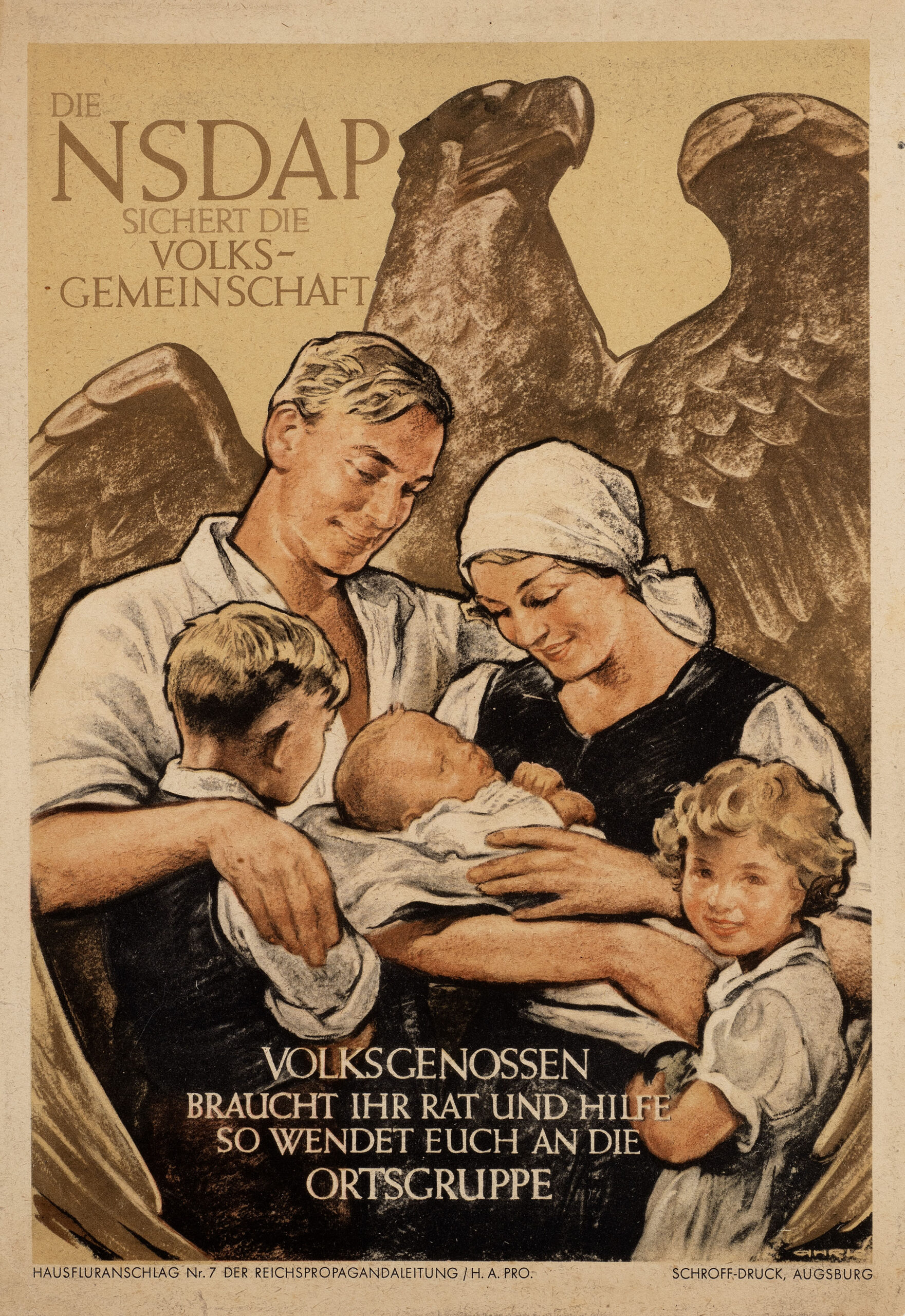The Volksgemeinschaft
A poster guaranteeing the Volksgemeinschaft (people’s community) for Germany’s citizens, who would flourish as an ethnically-homogenous national community under the aegis of National Socialism. The Volksgemeinschaft refers to a national community in which its citizens are united by a common culture, language and goal as well as the resulting sense of shared identity that would overcome class conflict. It is characterized by solidarity, cohesion and equality, and expects the selfless devotion of every individual towards the betterment of the larger community which is considered an extension of oneself. This ethos is captured in Hitler’s proclamation “Deutsche Volk, Hilf Dir Selbst! [German people, help yourself!]“. The establishment of this Volksgemeinschaft was one of the primary aims of National Socialism.
In its pursuit of what some would label ‘true’ socialism, National Socialism (as well as other variations of fascism) sought to eliminate class conflict through class collaboration. Its communitarian ethos strongly encourages a sense of altruistic sympathy for one’s neighbor but acknowledges the futility of applying this doctrine internationally, across different cultures who may not share the same values. It is understood that the success of such a programme is contingent on the existence of a culturally homogenous society of individuals who share both a common heritage and objective, and that societal cohesion breaks down in the absence of such deeply-ingrained, subconscious unifying elements. It is this which the ‘National’ within ‘National Socialism’ refers to, which predicted how multiculturalism invariably results in dysfunctional parallel societies spawning within.
What the Volksgemeinschaft is thought to offer aside from the practical benefits of social cohesion and harmony, is a sense of community. A shared consciousness and oneness between peoples, and mass spiritual wellbeing attained through unity in cause and purpose, an integral part of the human experience, and which without, leaves one a hollow shell of a man, according to philosophers such as Alain de Benoist:
Man evolved in cooperating groups united by common cultural and genetic ties, and it is only in such a setting that the individual can feel truly free, and truly protected…he feels a sense of destiny, of belonging to and being a part of a greater and more enduring entity. He rejoices in the secure belief that he shares in a heritage which it is part of his common duty to protect. – Alain de Benoist (1994)
Text reads: The NSDAP secures the Volksgemeinschaft. National comrades, if you need advice and help please contact your local district group.
Published by Schroff-Druck of Augsburg.
Free shipping on orders over $50!
- Satisfaction Guaranteed
- No Hassle Refunds
- Secure Payments
A poster guaranteeing the Volksgemeinschaft (people’s community) for Germany’s citizens, who would flourish as an ethnically-homogenous national community under the aegis of National Socialism. The Volksgemeinschaft refers to a national community in which its citizens are united by a common culture, language and goal as well as the resulting sense of shared identity that would overcome class conflict. It is characterized by solidarity, cohesion and equality, and expects the selfless devotion of every individual towards the betterment of the larger community which is considered an extension of oneself. This ethos is captured in Hitler’s proclamation “Deutsche Volk, Hilf Dir Selbst! [German people, help yourself!]“. The establishment of this Volksgemeinschaft was one of the primary aims of National Socialism.
In its pursuit of what some would label ‘true’ socialism, National Socialism (as well as other variations of fascism) sought to eliminate class conflict through class collaboration. Its communitarian ethos strongly encourages a sense of altruistic sympathy for one’s neighbor but acknowledges the futility of applying this doctrine internationally, across different cultures who may not share the same values. It is understood that the success of such a programme is contingent on the existence of a culturally homogenous society of individuals who share both a common heritage and objective, and that societal cohesion breaks down in the absence of such deeply-ingrained, subconscious unifying elements. It is this which the ‘National’ within ‘National Socialism’ refers to, which predicted how multiculturalism invariably results in dysfunctional parallel societies spawning within.
What the Volksgemeinschaft is thought to offer aside from the practical benefits of social cohesion and harmony, is a sense of community. A shared consciousness and oneness between peoples, and mass spiritual wellbeing attained through unity in cause and purpose, an integral part of the human experience, and which without, leaves one a hollow shell of a man, according to philosophers such as Alain de Benoist:
Man evolved in cooperating groups united by common cultural and genetic ties, and it is only in such a setting that the individual can feel truly free, and truly protected…he feels a sense of destiny, of belonging to and being a part of a greater and more enduring entity. He rejoices in the secure belief that he shares in a heritage which it is part of his common duty to protect. – Alain de Benoist (1994)
Text reads: The NSDAP secures the Volksgemeinschaft. National comrades, if you need advice and help please contact your local district group.
Published by Schroff-Druck of Augsburg.




